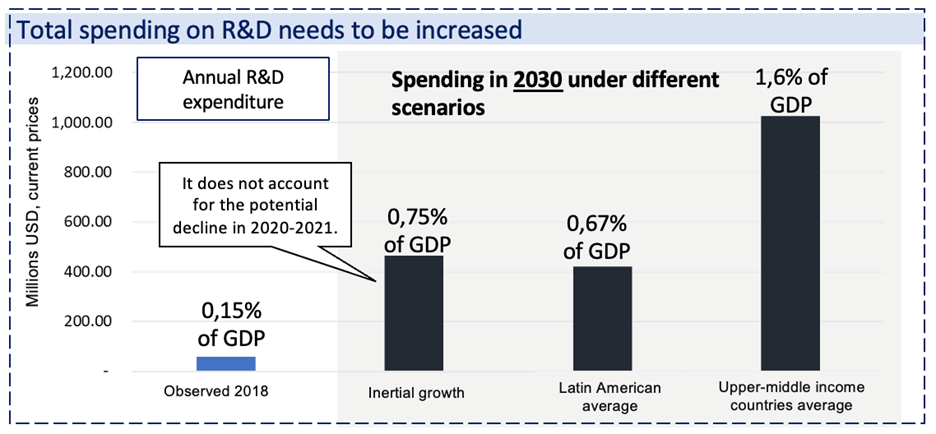Financing SDGs in Paraguay
Assessing Paraguay's progress toward achieving the SDGs with a focus on research and development, along with recommendations to increase private sector participation and incentives, strengthen institutional frameworks, and improve human capital training programs.
The Financing SDGs Project in Paraguay aimed to assess the country’s progress toward achieving the Sustainable Development Goals (SDGs) set for 2030 and identify effective strategies to accomplish them. The project encompasses three phases: diagnosing current conditions and progress at national and subnational levels, providing policy recommendations to address gaps between the baselines and the goals, and analyzing potential sources of financing for SDG investments. The findings revealed that Paraguay has made progress in some SDGs but still faces significant challenges in others.
Regarding research and development, the project found that gross expenditure on research and development (GERD) in Paraguay was 0.15% of GDP in 2018. This placed Paraguay below the average GERD of comparable income countries worldwide, which spend 1.6% of GDP. Moreover, the average GERD for Latin America and the Caribbean (LAC) is 0.67% of GDP, which is 4.5 times that of Paraguay. This lagging behind economic and regional peers limits the country’s competitiveness and long-term economic growth. To address this, Paraguay needs to increase this expenditure to at least the 1% threshold recommended by UNESCO. Under a more optimistic scenario, Paraguay could project this spending to reach the average of high-middle-income countries by 2030, developing a more competitive edge relative to regional peers. Additionally, Paraguay’s National Council for Science and Technology (CONACYT) also highlights concerns regarding the lack of private sector participation in research and development (R&D) activities. According to studies by the OECD, innovation processes require a wide range of public and private investments. However, the business sector’s investment in R&D in Paraguay is relatively low. According to data from the UNESCO Institute of Statistics, Paraguay’s business sector comprised only 0.37% of the total R&D expenditure in 2018. In contrast, countries with comparable incomes saw business sector participation in R&D averaging 43%.

While several programs and projects have been initiated to strengthen the National System of Science, Technology, and Innovation, Paraguay needs greater increases in R&D spending and promotion of greater private sector participation in the country’s scientific and technological activities and services. Moreover, countries with the highest investment in R&D like Korea, Israel, and Singapore had business sector participation rates between 60% to 80%. To address this, we developed policy recommendations with specific interventions in three components: institutional strengthening, incentives for R&D production, and advanced human capital training programs.
To strengthen institutional frameworks, we recommended improving communication and interaction between actors involved in the production and consumption of Science, Technology, and Innovation (STI), including the private sector, universities, government, and civil society. We also suggested involving the private sector in strategic planning regarding STI, promoting joint work and dialogue between the government, private sector, and civil society, and strengthening the functions of the National Council of Science and Technology (CONACYT).
Regarding incentives for R&D production, we advised policies and measures that favor private investment in national STI projects, along with the promotion of innovation and use of information and communication technologies. Additionally, we suggested conducting specific analyses to determine if Paraguay fulfills the necessary conditions to implement tax benefits, like those in Chile and Mexico, which have had a positive impact on private-sector investment in R&D.

To advance human capital training programs, we recommended creating and expanding postgraduate and specialized training programs in knowledge areas where Paraguay has demonstrated the highest competitiveness. We also recommended strengthening scholarship programs and establishing cooperation agreements with international universities and research centers to develop a National Program of Centers of Excellence.
The Financing SDGs in Paraguay Project in Paraguay provided valuable insights into the country’s progress toward achieving the SDGs, including the research and development sector. While Paraguay has made some positive strides in this area, it still must increase investment in R&D and encourage greater participation from the private sector. The recommendations put forward in this project provide a roadmap for policymakers to achieve these goals and ensure the long-term growth and competitiveness of the country.
Dayra Lascano Urbina
Dayra is pursuing a Master of Public Policy focused on program design and evaluation and peace and security at the School of Global Policy and Strategy at UC San Diego. She is also a policy analyst with more than ten years of experience in government and global politics.

